Unit 3 Our Hobbies Topic 3 What were you doing at this time yesterday SectionD课件(30张PPT)
文档属性
| 名称 | Unit 3 Our Hobbies Topic 3 What were you doing at this time yesterday SectionD课件(30张PPT) |
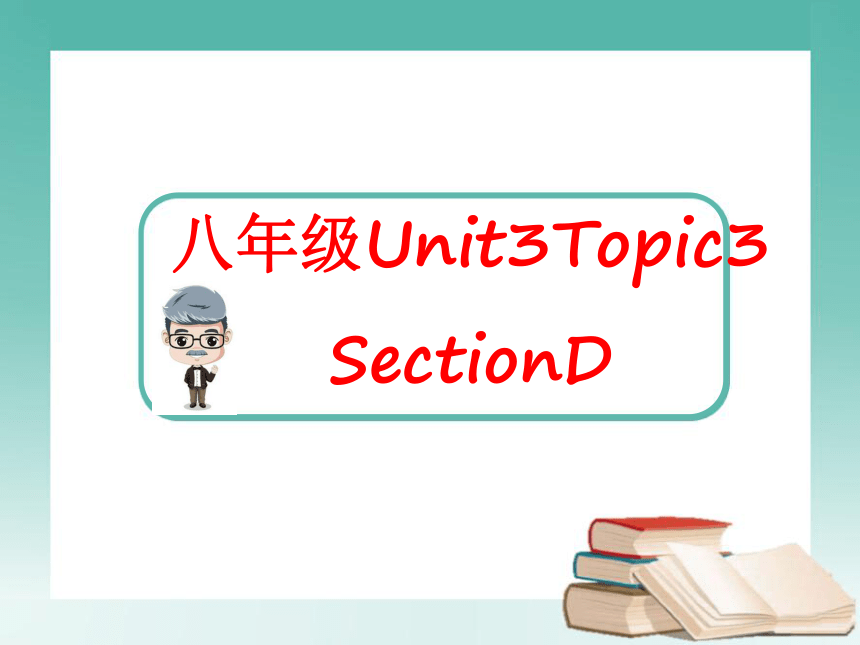
|
|
| 格式 | zip | ||
| 文件大小 | 3.9MB | ||
| 资源类型 | 教案 | ||
| 版本资源 | 仁爱科普版 | ||
| 科目 | 英语 | ||
| 更新时间 | 2018-12-02 00:00:00 | ||
图片预览

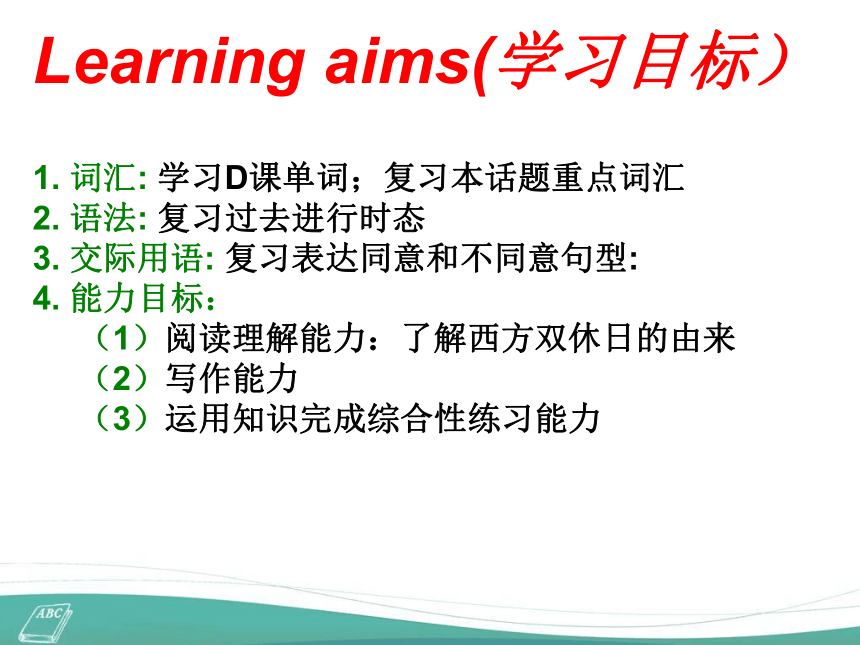

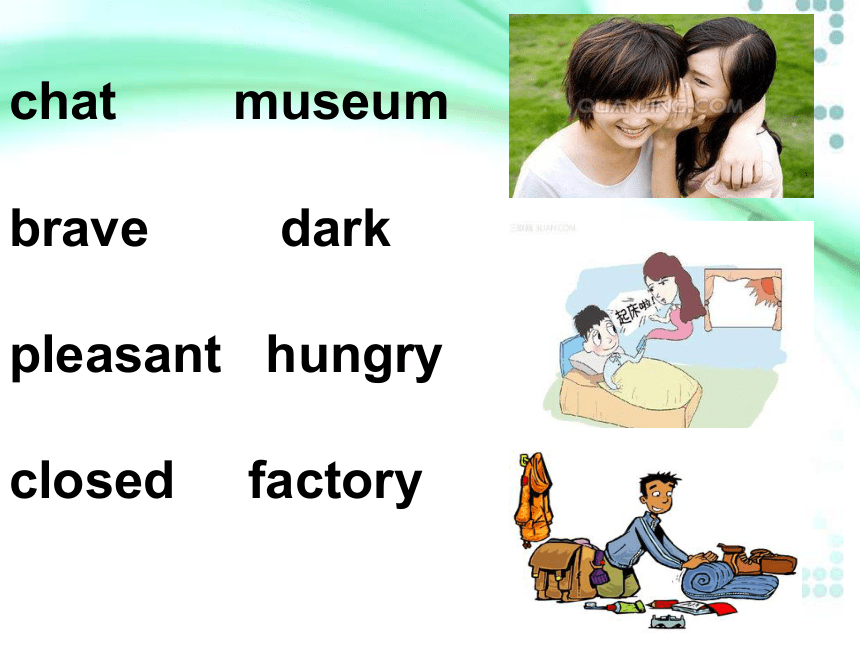


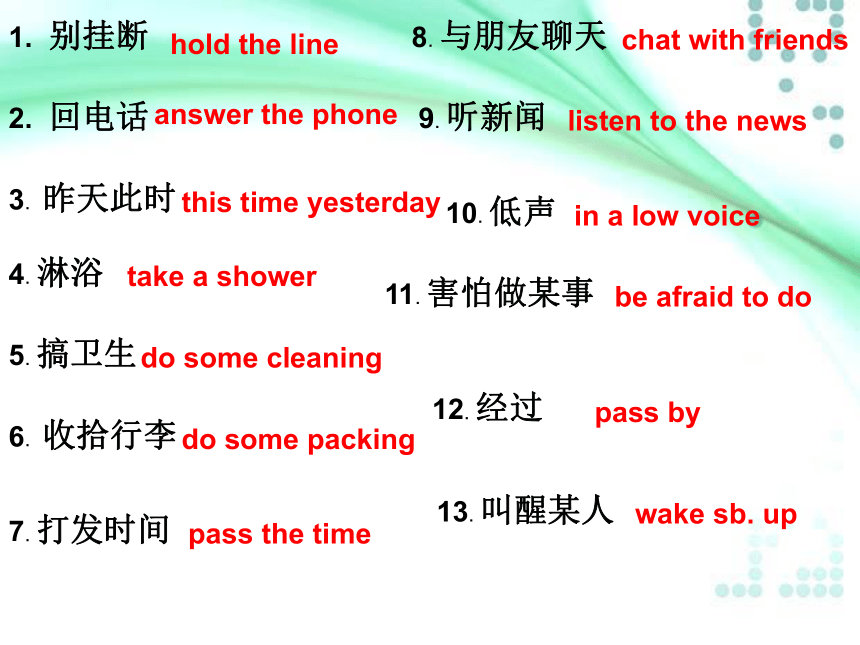

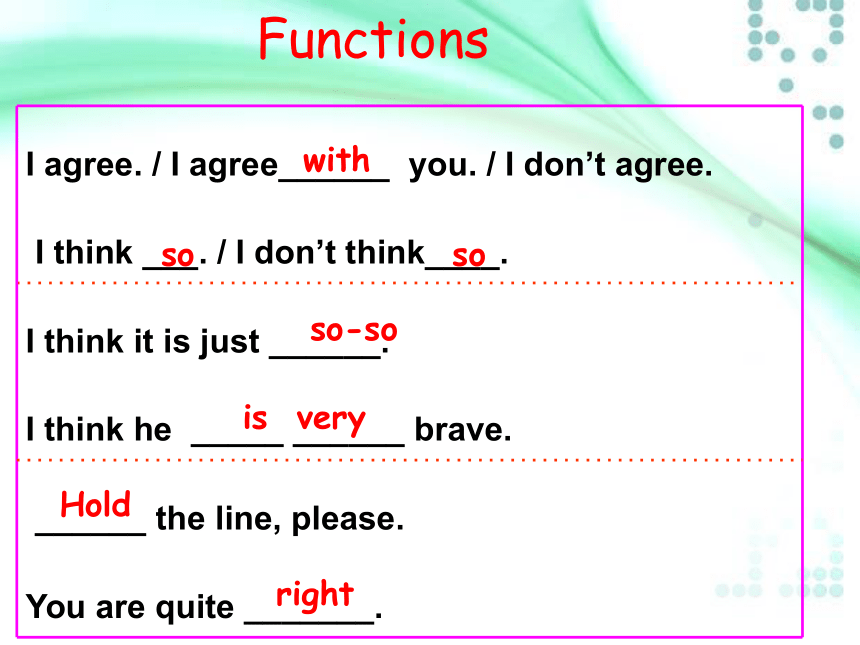
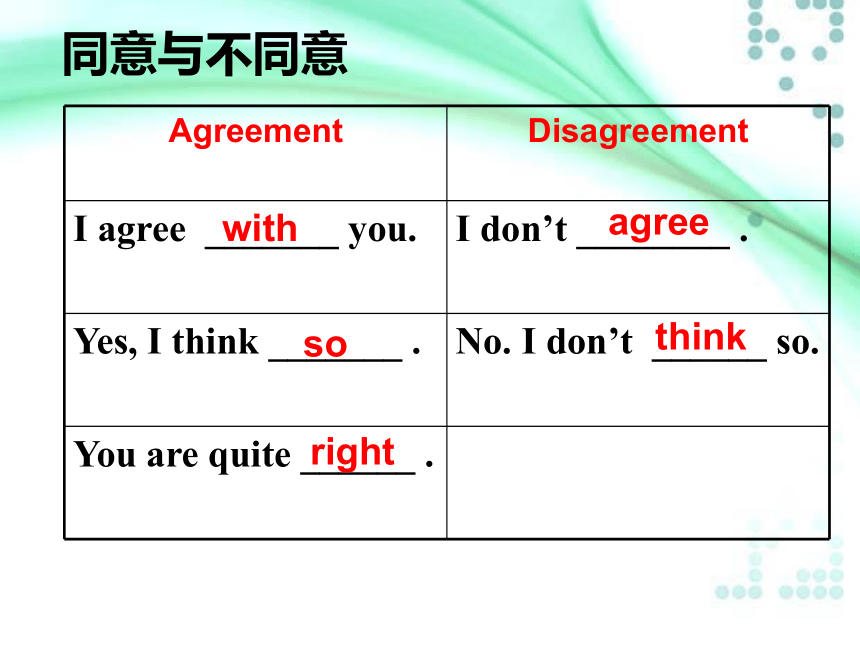


文档简介
课件30张PPT。八年级Unit3Topic3
SectionD
1. 词汇: 学习D课单词;复习本话题重点词汇
2. 语法: 复习过去进行时态
3. 交际用语: 复习表达同意和不同意句型:
4. 能力目标:
(1)阅读理解能力:了解西方双休日的由来
(2)写作能力
(3)运用知识完成综合性练习能力
Learning aims(学习目标)本话题词汇训练游戏:苍蝇拍chat museum
brave dark
pleasant hungry
closed factory Well done本话题短语训练俩俩PK赛1. 别挂断
2. 回电话
3. 昨天此时
4. 淋浴
5. 搞卫生
6. 收拾行李
7. 打发时间
8. 与朋友聊天
9. 听新闻10. 低声11. 害怕做某事12. 经过13. 叫醒某人 hold the line
answer the phone
this time yesterday
take a shower
do some cleaning
do some packing
pass the time
chat with friends
listen to the newsin a low voicebe afraid to dopass bywake sb. up交际用语闯关Functionswithsososo-sois veryHoldright
withagreesothinkright同意与不同意stampsclassical musicTalk: weekenda short history of the weekend Before 1800(十九世纪),there was no weekends.In England,people spent one day a week at church.They prayed , rested and played games. People called it “a holy day”(圣日).
In 1874,English people had one and
a half days’ holiday.By 1930(到1930 年),American people also had one and a half days' holiday.
By 1940,the two-day weekend began.a holy day(圣日)one and a half days’ holiday
( weekend )a two-day weekendA Short History of the Weekend视频1-P77Read the passage and complete it with the correct expressions. felt too tired to work
were closed all day
rested and prayed
made Saturday
afternoon a holiday
C A D B视频1-P77questions:
1.Why did workers feel tired on
Monday mornings?
2.What's the Chinese meaning of“blue”
in the passage?
3.How did people solve the problem
of“blue Mondays”Because they played games and had fun
on the holy day.忧郁的,悲观的People made Saturday afternoon holiday.in the 1800s 在十九世纪
读作: in the eighteen hundreds
in the early 1800s 在十九世纪早期
in the 1920s 在20世纪20年代
读作: in the nineteen twentiestoo…to…太 …以至不能…
too+形容词/副词+to+动词原形…
1. He is too young to go to school.2.他太懒了以至不能按时完成作业。He is too lazy to finish the homework on time.可以和so…that(否定句)..句型进行改写4行:They felt too tired to work on Monday mornings.7行:At one o’clock,everyone stopped working.They were tired so they stop working.They were tired so they stopped to have a rest.stop doing sth.
stop to do sth.停止正在做的事
停止(正在做的事)…去做(其他事情)练习:On my way home, I stopped _______(buy)
some bread.to buystop doing sth.停止正在做的事
找出文中短语in the early 1800ssolve the problemstop doing sth.the beginning ofby 1930two-day weekend2.在十九世纪早期3.解决问题5....的开端6.到1930年7.两天的周末4.停止做某事1.玩得开心have fun课堂阶段小测1.We will have a _________________(三天的假期)
next week.
2.The baby is sleeping , please stop ________(talk).
3.He is so short that he can’t catch the apples
on the tree.(同义句)
He is _____short _____ ____the apples on the tree.
4.Lu Xun’s novels came out _________________
(在20世纪30年代)
5.It is _______________(…的开端) the story.
three-day holidaytalkingtootocatchin the 1930sthe beginning of语法大闯关
过去进行时态
was/were+doingGrammarPast Continuouswas takingwere gettingWereweredoingwas washing看图写话read English,
at 8 yesterday9:00 – 12:00 a.m. yesterday plant treesHe was reading English
at eight yesterday.They were planting trees
from nine to twelve o’clock yesterday morning.能力提升:写作Task: writingDid you have a good time last Sunday?
What were you doing at different times?
Write a passage about it. 以“My Sunday”为题,写一70词左右短文,
描述上周不同时间你正在做的事情及感受,注意时态。 Last Sunday I was very busy. I _________
_____________________________________
_________________________________ My Sunday
Last Sunday I was very busy. I got up at 7:00 o’clock. I went to the movie theater with my friend. I was watching a wonderful movie from nine to eleven in the morning. I was very happy. In the afternoon, I helped my mother do some cleaning. I was washing my clothes at half past two. Jim called me to play basketball with him. We were playing basketball happily from three to four. I felt tired.
I went with my parents to see my grandparents in the evening. I was talking with my grandmother at seven. I was excited.
I had a busy day, but I was happy.
SectionD
1. 词汇: 学习D课单词;复习本话题重点词汇
2. 语法: 复习过去进行时态
3. 交际用语: 复习表达同意和不同意句型:
4. 能力目标:
(1)阅读理解能力:了解西方双休日的由来
(2)写作能力
(3)运用知识完成综合性练习能力
Learning aims(学习目标)本话题词汇训练游戏:苍蝇拍chat museum
brave dark
pleasant hungry
closed factory Well done本话题短语训练俩俩PK赛1. 别挂断
2. 回电话
3. 昨天此时
4. 淋浴
5. 搞卫生
6. 收拾行李
7. 打发时间
8. 与朋友聊天
9. 听新闻10. 低声11. 害怕做某事12. 经过13. 叫醒某人 hold the line
answer the phone
this time yesterday
take a shower
do some cleaning
do some packing
pass the time
chat with friends
listen to the newsin a low voicebe afraid to dopass bywake sb. up交际用语闯关Functionswithsososo-sois veryHoldright
withagreesothinkright同意与不同意stampsclassical musicTalk: weekenda short history of the weekend Before 1800(十九世纪),there was no weekends.In England,people spent one day a week at church.They prayed , rested and played games. People called it “a holy day”(圣日).
In 1874,English people had one and
a half days’ holiday.By 1930(到1930 年),American people also had one and a half days' holiday.
By 1940,the two-day weekend began.a holy day(圣日)one and a half days’ holiday
( weekend )a two-day weekendA Short History of the Weekend视频1-P77Read the passage and complete it with the correct expressions. felt too tired to work
were closed all day
rested and prayed
made Saturday
afternoon a holiday
C A D B视频1-P77questions:
1.Why did workers feel tired on
Monday mornings?
2.What's the Chinese meaning of“blue”
in the passage?
3.How did people solve the problem
of“blue Mondays”Because they played games and had fun
on the holy day.忧郁的,悲观的People made Saturday afternoon holiday.in the 1800s 在十九世纪
读作: in the eighteen hundreds
in the early 1800s 在十九世纪早期
in the 1920s 在20世纪20年代
读作: in the nineteen twentiestoo…to…太 …以至不能…
too+形容词/副词+to+动词原形…
1. He is too young to go to school.2.他太懒了以至不能按时完成作业。He is too lazy to finish the homework on time.可以和so…that(否定句)..句型进行改写4行:They felt too tired to work on Monday mornings.7行:At one o’clock,everyone stopped working.They were tired so they stop working.They were tired so they stopped to have a rest.stop doing sth.
stop to do sth.停止正在做的事
停止(正在做的事)…去做(其他事情)练习:On my way home, I stopped _______(buy)
some bread.to buystop doing sth.停止正在做的事
找出文中短语in the early 1800ssolve the problemstop doing sth.the beginning ofby 1930two-day weekend2.在十九世纪早期3.解决问题5....的开端6.到1930年7.两天的周末4.停止做某事1.玩得开心have fun课堂阶段小测1.We will have a _________________(三天的假期)
next week.
2.The baby is sleeping , please stop ________(talk).
3.He is so short that he can’t catch the apples
on the tree.(同义句)
He is _____short _____ ____the apples on the tree.
4.Lu Xun’s novels came out _________________
(在20世纪30年代)
5.It is _______________(…的开端) the story.
three-day holidaytalkingtootocatchin the 1930sthe beginning of语法大闯关
过去进行时态
was/were+doingGrammarPast Continuouswas takingwere gettingWereweredoingwas washing看图写话read English,
at 8 yesterday9:00 – 12:00 a.m. yesterday plant treesHe was reading English
at eight yesterday.They were planting trees
from nine to twelve o’clock yesterday morning.能力提升:写作Task: writingDid you have a good time last Sunday?
What were you doing at different times?
Write a passage about it. 以“My Sunday”为题,写一70词左右短文,
描述上周不同时间你正在做的事情及感受,注意时态。 Last Sunday I was very busy. I _________
_____________________________________
_________________________________ My Sunday
Last Sunday I was very busy. I got up at 7:00 o’clock. I went to the movie theater with my friend. I was watching a wonderful movie from nine to eleven in the morning. I was very happy. In the afternoon, I helped my mother do some cleaning. I was washing my clothes at half past two. Jim called me to play basketball with him. We were playing basketball happily from three to four. I felt tired.
I went with my parents to see my grandparents in the evening. I was talking with my grandmother at seven. I was excited.
I had a busy day, but I was happy.
同课章节目录
- Unit 1 Playing Sports
- Topic 1 I'm going to play basketball.
- Topic 2 I'll kick you the ball again.
- Topic 3 The school sports meet is coming.
- Unit 2 Keeping Healthy
- Topic 1 You should brush your teeth twice a day.
- Topic 2 I must ask him to give up smoking.
- Topic 3 Must we exercise to prevent the flu?
- Unit 3 Our Hobbies
- Topic 1 What's your hobby?
- Topic 2 What sweet music!
- Topic 3 What were you doing at this time yesterday
- Unit 4 Our World
- Topic 1 What's the strongest animal on the farm?
- Topic 2 How can we protect ourselves from the eart
- Topic 3 The Internet makes the world smaller.
